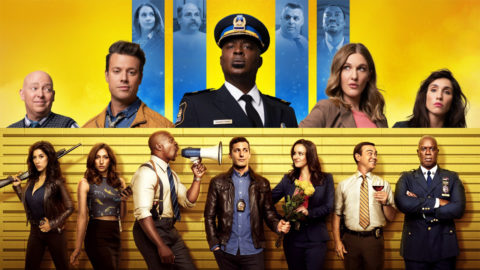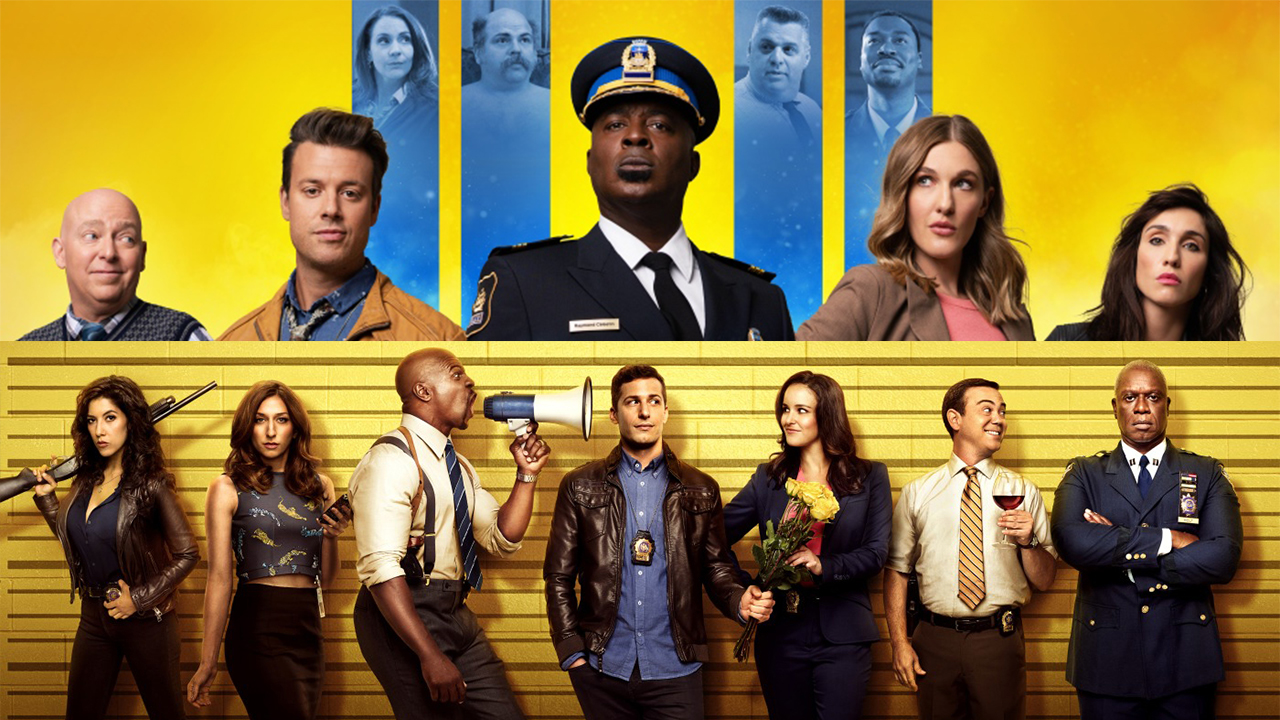We Really Don’t Need a Quebecois Brooklyn Nine-Nine
Its whitewashing of Latinx characters is just one of the reasons...

On August 19, the trailer for Escouade 99, a Quebecois remake of Brooklyn Nine-Nine, was officially released. The French-language spin on the hit NBC sitcom is set to air on Vidéotron’s Club Illico starting September 17.
In response to the trailer, Melissa Fumero, who stars as Amy Santiago on the original series, tweeted, “This is like peeking through another dimension.”
OMG OMG OMG‼️ This is like peeking through another dimension https://t.co/ZccuX0qxoF
— Melissa Fumero (@melissafumero) August 20, 2020
It’s true: From this first glimpse, the new show looks pretty identical to Brookyln Nine-Nine, from the characters to the plot to the set design—just with new actors, and in French.
But then Fumero noticed another difference. The next day, she followed up with this tweet: “While I understand the Latina population is very small in Quebec (& how many of them are funny actors?), the Amy and Rosa roles could’ve gone to ANY BIPOC, so it’s disappointing to see that missed opportunity.”
I’ve been thinking about this a lot, and it basically comes down to this… while I understand the Latina population is v small in Quebec (& how many of them are funny actors?) the Amy n Rosa roles could’ve gone to ANY BIPOC so it’s disappointing to see that missed opportunity.
— Melissa Fumero (@melissafumero) August 21, 2020
The roles of Amy Santiago and Rosa Diaz—Latinx characters played by Fumero and Stephanie Beatriz in the original sitcom—have been given to white Quebecoise actors Mylène Mackay and Bianca Gervais in the remake.
But the whitewashing of these characters isn’t the only reason this show should have stayed on the cutting room floor. Here’s why we really don’t need a French-Canadian Brooklyn Nine-Nine.
Canadian Media Has a Diversity Problem
Unfortunately, this is far from an isolated incident when it comes to whitewashing in films and TV shows. Where representation is concerned, both on screen and behind the scenes, it’s clear that the media industry lacks diversity—especially the industry here in Canada. As Refinery 29 points out, while there’s been a “Black renaissance” in American TV over the past several years, that trend has failed to cross the border. Indeed, if you look at the past 70 years of Canadian broadcasting, you’ll find that most of the shows are exclusively white.
Beyond representation issues, Quebec specifically also has a troubling history of cultural appropriation and blackface in its theatre and media. Only a short time ago, in 2017, hockey player P.K. Subban was portrayed by a white actor wearing blackface makeup in Théâtre du Rideau Vert. Yikes.
It’s a low bar, so admittedly we were pleasantly surprised to see that the roles of Commander Holt and Sergeant Jeffords—played by Black actors in Brooklyn Nine-Nine—were rightfully cast with Black actors Widemir Normil and Fayolle Jean Jr for Escouade 99. But why didn’t the roles of Amy Santiago and Rosa Diaz, Latinx characters who are played by Latinx actors in the original show, go to any Latinx Canadian actors?
If the issue was, as Fumero points out, that there are no well-known Latinx-Quebecoise actors who were qualified to fill the roles, we have to question if that’s because Canadian media hasn’t fully opened the door for their stories to be heard and shared. While it’s fair that Quebec has a smaller population of visible minorities compared to other big provinces like Ontario and British Columbia, and only 1.5% are Latinx, Latinx people are still the third largest group of visible minorities in the province. And, as Fumero points out, the roles could otherwise have been given to any Black, Indigenous or person of colour. In a report published by Women In View, studies from 2017 show that only 1.81% of TV contracts went to women of colour, and 0% went to Indigenous women in Canada that year—so we clearly have a long way to go, and keeping these characters as WOC would have been a small but important step toward greater representation.
The talent is there, we just aren’t tapping into it. As Nathalie Younglai, founder of BIPOC TV & Film points out in an article for the CBC: “I don’t think white folks realize how frustrating or disrespectful it is to hear ourselves referred to as “new” or “emerging” when we’ve been working a long time, or how offensive it is to be told that no one has kept track of how many projects are created and controlled by BIPOC creatives because no white person cared or understood the importance of representation.”
It’s important to remember that the lack of diversity on screen is also a reflection on the white showrunners and casting directors working behind the scenes. After all, they’re the ones who hire the actors. “I do not mean to shame these actresses,” Fumero tweeted referring to Mackay and Gervais. “It’s not their fault… it’s up to the decision makers.”
Do We Really Need Another Cop Show?
In the past year, Canada has only had a total of 69 new series debuts, compared to the U.S. which had 684. With so few shows given opportunities to make it to the air, it’s hard not to wonder why a show like Escouade 99—a derivative remake of a show thats *still* on the air—was greenlit when this opportunity could’ve gone to a more original—and inclusive—project.
In addition to American imports like Brooklyn Nine-Nine, Law & Order, NCIS and Blue Bloods, Canada also already has Rookie Blue and is getting another new cop show: Earlier this year, CBC announced a new original female-led series Lady Dicks. And while we love to see Meredith MacNeill (who stars in Baroness von Sketch Show) and Adrienne C. Moore (Cindy “Black Cindy” Hayes from Orange Is The New Black) together on this project, we really don’t need more police propaganda.
In these shows, the cops are always the protagonists, making them well-liked, relatable and even funny. With the uprising of the Black Lives Matter movement, which has turned the world’s attention to the systemic violence and ongoing murder of Black people by police, a sitcom that humanizes law enforcement is the last thing we want to see on our screens right now. Even the original Brooklyn Nine-Nine crew seems to agree. In an interview with People, Andy Samberg, who plays the role of Jake Peralta, opened up about reevaluating the show. “We’re taking a step back, and the writers are all rethinking how we’re going to move forward, as well as the cast,” says Samberg. “We’re all in touch and kind of discussing how you make a comedy show about police right now, and if we can find a way of doing that that we all feel morally okay about.” On June 2, showrunner Dan Goor also tweeted that he and the cast donated $100,000 to the National Bail Fund Network in support of the BLM protesters.
With the very few original Canadian TV shows being made, what we need are unique and creative programs that actually amplify and celebrate the stories of marginalized communities. The Canadian media industry needs to take action towards having diversity behind the screen to produce more shows like Trickster, Kim’s Convenience and Diggstown. Shows that truly highlight the positive stories of Black, Indigenous and people of colour—instead of the people who are actively oppressing them.









